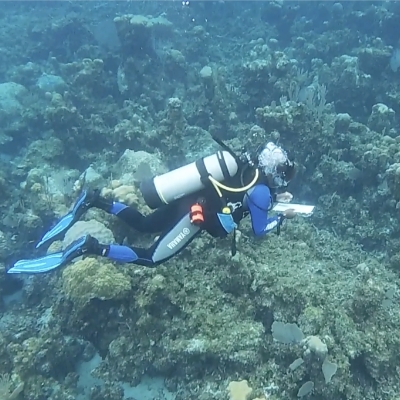Stony Coral Tissue Loss Disease Assessments
Leadership
Research Team
Project Overview
Stony Coral Tissue Loss Disease (SCTLD) was first observed in The Bahamas in late 2019 and early 2020 and has since spread to at least 7 different islands by May 2022. This disease poses the greatest short-term threat to corals in The Bahamas due to its high mortality rate, rapid spread, wide range of species of reef building corals affected (25 species documents in the Bahamas to date), and yet unidentified pathogen(s) causing the disease. Nevertheless, scientists have found ways to minimize spread of the disease, save infected coral colonies before they suffer complete mortality to prevent loss of species, and have developed genetic rescue strategies as a last resort effort to provide the brood stock for reef recovery following the devastating effects of the pandemic. This project is focused on the identification of areas with SCTLD, their assessment, and use of antibiotics to save priority coral species and colonies at priority sites, following a strategy developed by the Bahamas Stony Coral Tissue Loss Disease Task Force in 2020.
Duration of Project
Ongoing since 2020
Expedition Summary
Over the course of four days, three researchers, led by Dr. Krista Sherman conducted multiple dives a day at several different sites. The sites were located all along the eastern coast of Andros, the largest island in the Bahamas. DISCOVERY Yacht Andromeda acted as both lodging and transportation between about 3 or 4 anchorage sites. Starting in the north, the team would either dive directly from the yacht, or would take the tender to a number of other dive sites throughout the day. This continued for about four days, as the yacht would move south anchoring for the night, then continuing on to the next anchorage site. The team observed that the northern reefs were disease free, but as we moved further south, signs of infected corals began to appear.
It was a very successful trip as they were able to accomplish far more than they could have using a smaller non-live-aboard vessel. What's more, having an air compressor onboard for refilling scuba tanks meant that the team could simply refill their tanks while out at sea. This all saved time and money, allowing the researchers to focus on the research, rather than logistical and budgetary concerns.
Application
All data collected will be strictly shared with the Department of Environmental Planning & Protection in accordance with the research permitting process. Long term, this will help protect the coral reefs of the Bahamas, and hopefully, coral species and reefs in other regions using similar methods.
Location
Andros, The Bahamas

